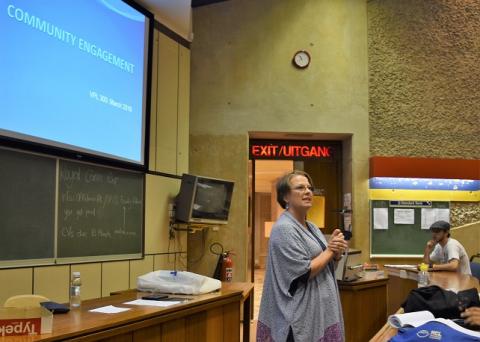Veterinarian trainers integrate rabies awareness into community engagement studies in South Africa
The University of Pretoria (UP) Onderstepoort Veterinary Faculty has integrated the Rabies Educator Certificate (REC) into the veterinarian-training coursework, including the resource in their community engagement module this year. The community engagement module focuses on rabies education, as well as the issues surrounding organised dog fighting. 174 South African veterinary science students (currently beginning their 3rd year of training) were introduced to rabies for the first time in their studies when GARC was invited to present a guest lecture on community engagement with the specific theme of rabies.
The guest lecture was presented by GARC team members and focussed on the importance of rabies and the various impacts–economic, social and psychological–that rabies has on people and the community. The immediate impact of the lecture was clear when some students asked for advice on suspected rabies cases in their areas, and others spoke about personal experiences, including the tragic death of a family member due to rabies.
The freely available, online educational resources available on the GARC Education Platform were the primary focus of the lecture, with their implementation and use in communities being stressed as an effective means of disseminating life-saving information regarding rabies and its prevention. Primary animal healthcare, rabies vaccination, bite prevention and the negative impacts of dog culling–both for rabies control and animal welfare–were addressed.
Dr Quixi Sonntag, a lecturer at the UP Onderstepoort Veterinary Faculty, attended the inaugural Pan-African Rabies Control Network (PARACON) meeting in June last year, and after seeing the presentations about the GARC Education Platform–including the REC and the educational booklet Want a Friend–expressed keen interest in possible collaborative work between the University of Pretoria and GARC. Subsequent to the PARACON meeting, a flurry of email communications followed, and the UP community engagement coordinator helped the GARC team to organise a school visit on World Rabies Day last year, where 100 educational booklets were distributed by the GARC team to the enthusiastic children. In an effort to engage other children in the community, several hundred booklets will also be distributed by the veterinary students in the various provinces they visit in South Africa as part of their community engagement module.
Through the use of the booklet for children and the REC, communities will become more aware of rabies and its prevention. In addition, the future veterinary professionals of South Africa will be more aware and educated about the importance of rabies prevention. We hope that the interest shown from the students during the lecture will persist into future endeavours to help eliminate canine-mediated human rabies globally by 2030.
Submitted by Terence Scott, GARC and Pan-African Rabies Control Network (PARACON) Steering Committee
